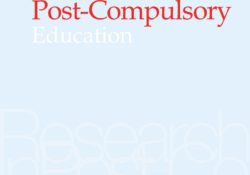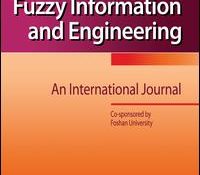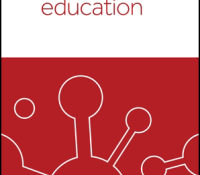tandfonline.com har udgivet en rapport under søgningen “Teacher Education Mathematics”: Maths, German, and English teachers’ student specific self-efficacy – is it a matter of students’ characteristics? Link til kilde
Like this:
Like Loading...
tandfonline.com har udgivet en rapport under søgningen “Teacher Education Mathematics”: ABSTRACT Formulae display:?Mathematical formulae have been encoded as MathML and are displayed in this HTML version using MathJax in order to improve their display. Uncheck the box to turn MathJax off. This feature requires Javascript. Click on a formula to zoom. ABSTRACT The present study proposes a flexible/soft model for investigating the role of philosophic-mindedness, creativity, mathematics self-efficacy, and mathematics self-concept in predicting math achievement. To do this end, a fuzzy regression model is developed. Two common criteria are used to evaluate the obtained model. Moreover, the predictability of the model is explained. The case study involves 28 male students from Marand, Iran (year 2015–2016) who took part in a test of mathematics achievement. The participants were junior high-school students… Continue Reading →
Like this:
Like Loading...
tandfonline.com har udgivet en rapport under søgningen “Teacher Education Mathematics”: Changing teachers’ self-efficacy, beliefs and practices through STEAM teacher professional development (Cambios en la autoeficacia, creencias y prácticas docentes en la formación STEAM de profesorado) Link til kilde
Like this:
Like Loading...
tandfonline.com har udgivet en rapport under søgningen “Teacher Education Mathematics”: Secondary school students and self-efficacy in mathematics: Gender and age differences Link til kilde
Like this:
Like Loading...
eric.ed.gov har udgivet: The study contains a total of 44 inservice or practicing teachers who were enrolled in professional development courses. A novel survey was created to determine a teacher’s perspective of his/her school culture, as well as to measure a teacher’s science achievement, math achievement, science self-efficacy, and math self-efficacy. The survey was administered at the beginning and end of the Physics and Integrated Math and Science Methods courses. Results show the changes of math and science self-efficacy beliefs and school culture beliefs. At the end of the Physics and Integrated Science and Math Methods courses, the inservice teachers believed they could motivate students to enjoy math/science, and the teachers also felt competent to answer questions about math/science experiments. The inservice teachers felt they could assist their colleagues with… Continue Reading →
Like this:
Like Loading...
tandfonline.com har udgivet en rapport under søgningen “Teacher Education Mathematics”: Link til kilde
Like this:
Like Loading...
tandfonline.com har udgivet en rapport under søgningen “Teacher Education Mathematics”: Abstract Abstract Academic self-efficacy is mostly construed as specific; task-specific, course-specific or domain-specific. Previous research in the Danish university context has shown that the self-efficacy subscale in the Motivated Strategies for Leaning Questionnaire is not a single scale, but consists of two separate course- and activity-specific scales; the Specific Academic Learning Self-Efficacy Scale (SAL-SE) and the Specific Academic Exam Self-efficacy scale (SAE-SE). The SAL-SE and the SAE-SE subscales have previously been found to fit the Rasch model, have excellent reliability, and initial evidence of criterion validity has been established. The aim of this study was to conduct a new validity study of the SAL-SE and SAE-SE scales in the Danish university context. Specifically, whether the original findings of fit to… Continue Reading →
Like this:
Like Loading...

tandfonline.com har udgivet en rapport under søgningen “Teacher Education Mathematics”: Abstract Abstract One of the causes of the science teacher shortage is the low enrollment in science teacher education. In the Netherlands, science undergraduates can enroll in a half-year teaching course that leads to a teacher qualification for junior secondary education. The goal is that these undergraduates continue in teacher education to obtain a full qualification. The present study investigated how self-efficacy was related to continuing in teacher education, and to commitment, perceived workload, and stress. Moreover, we investigated how mastery experiences, vicarious experiences, social persuasions, and emotional states influenced self-efficacy. Findings based on 69 science undergraduates showed that self-efficacy was positively related to commitment and negatively to workload and stress, but unrelated to continuing in teacher education. Mastery experiences… Continue Reading →
Like this:
Like Loading...

tandfonline.com har udgivet en rapport under søgningen “Teacher Education Mathematics”: Abstract Abstract Findings from recent studies suggest that students’ pathways into mathematics-related careers begin as early as middle school when students are forming lasting self-perceptions of their academic abilities. Middle school is also a time when students begin making choices about future coursework in math, science, and technology that will have long-term implications for their academic and career achievements. Because important self-efficacy beliefs are forming and young adolescents are making decisions that impact career choice, it is important to provide support for students early in their schooling to maximize student potential and consideration of mathematics education and mathematics-related careers. Supporting self-efficacy for math is important for most middle school students but may be crucial for girls who often experience significant… Continue Reading →
Like this:
Like Loading...

tandfonline.com har udgivet en rapport under søgningen “Teacher Education Mathematics”: Abstract Abstract Academic self-efficacy is a crucial predictor of first-year university study success, which makes it a key intended outcome of pre-university education. Students with high academic self-efficacy at the end of secondary education likely experience a better transition to university. This study aimed to investigate which factors relate to Dutch secondary school students’ self-efficacy in terms of being a successful university student, including a personality variable (i.e. need for cognition), a motivational variable (academic interest), and behavioural variables (student engagement and out-of-school academic activities). Structural equation models served to test the proposed model. The results revealed that need for cognition, academic interest, and out-of-school academic activities related directly to self-efficacy; need for cognition and academic interest were especially pertinent.… Continue Reading →
Like this:
Like Loading...








